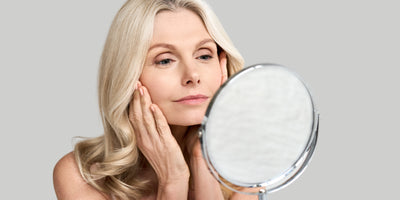
Unlocking the Secrets to a Radiant Complexion With Astaxanthin
The Powerful Antioxidant for Skin Health
Astaxanthin, a potent antioxidant, is steadily gaining recognition in the field of skincare for its skin-enhancing properties. Found in certain types of algae and the marine life that feed on them, like salmon and shrimp, this carotenoid is what gives these organisms their vibrant pink hue. But it is not just a colorant – astaxanthin boasts significant health benefits, notably for skin health.
The prowess of astaxanthin lies in its robust antioxidant properties, which are thought to surpass other carotenoids like beta-carotene and lutein. It combats the harmful effects of free radicals, unstable molecules that can damage cells and contribute to aging and diseases. When applied to the skin or taken orally, astaxanthin targets free radicals, reducing oxidative stress, and promoting healthier skin.
Research suggests that the antioxidant potential of astaxanthin is significantly stronger than that of vitamin C and E, two nutrients commonly used in skincare for their antioxidant properties. The unique molecular structure of astaxanthin allows it to span the entire cell membrane, providing comprehensive protection from oxidative stress.
The potent antioxidant activity of astaxanthin also plays a pivotal role in preventing and mitigating skin damage caused by exposure to UV rays, environmental pollutants, and lifestyle factors like poor diet and smoking. By counteracting oxidative stress, astaxanthin helps to preserve the skin's health, integrity, and youthful appearance.
How It Benefits Your Complexion
Astaxanthin's benefits are not limited to its potent antioxidant properties. Several studies suggest that this powerful carotenoid can enhance skin health and beauty in several other ways.
One significant advantage of astaxanthin is its potential to reduce wrinkles and improve skin texture. A study published in the "Journal of Medicinal Food" found that individuals who took an astaxanthin supplement experienced a significant reduction in the size and number of wrinkles, an increase in skin moisture, and an overall improvement in skin texture.
Astaxanthin also has the potential to brighten the skin and even out skin tone. As an antioxidant, it can inhibit the production of melanin, the pigment responsible for skin color. Overproduction of melanin, triggered by factors like sun exposure, can result in hyperpigmentation, including age spots and melasma. By curbing melanin production, astaxanthin can help to lighten these discolorations and promote an even skin tone.
Moreover, astaxanthin has been found to boost blood flow to the skin, resulting in a radiant, healthy glow. This increased circulation delivers more oxygen and nutrients to skin cells, promoting their health and vitality.
Protecting Your Skin from Within: Astaxanthin and UV Damage
One of the leading causes of premature skin aging is exposure to ultraviolet (UV) rays from the sun. UV radiation can cause an array of skin damage, from sunburn and hyperpigmentation to wrinkles and skin cancer. The antioxidant properties of astaxanthin can help protect the skin from the harmful effects of UV radiation.
Astaxanthin does not absorb UV light like sunscreens do but rather works from the inside to mitigate the damaging effects of UV exposure. It does this by neutralizing the free radicals generated by UV rays before they can harm the skin.
In addition to its role as an internal sunscreen, astaxanthin has been found to enhance the skin's natural resistance to sunburn. A study published in "Acta Biochimica Polonica" found that supplementing with astaxanthin increased the amount of time participants could spend in the sun without burning.
While it should not replace topical sunscreens, astaxanthin can supplement their use by offering additional, cellular-level protection against sun damage. It's an added defense mechanism that can be particularly beneficial for individuals with sun-sensitive skin or those living in regions with high UV index levels.
Astaxanthin's Role in Fighting Inflammation and Reducing Redness
Inflammation plays a critical role in numerous skin conditions, such as acne, rosacea, and psoriasis. Astaxanthin's anti-inflammatory properties have shown promise in soothing inflammatory skin conditions and reducing associated redness.
Astaxanthin inhibits the production of inflammatory cytokines, molecules that stimulate an inflammatory response. By doing so, it can help to calm inflammation and reduce redness, providing relief for various skin conditions.
Furthermore, astaxanthin's ability to enhance blood flow can also help to decrease skin redness. By boosting circulation, it can help to flush out inflammatory toxins and bring in fresh, oxygenated blood, promoting a more balanced and less inflamed complexion.
In addition to its potential in treating inflammatory skin conditions, astaxanthin's anti-inflammatory properties can also play a role in maintaining skin health. Chronic inflammation can accelerate skin aging, and by reducing inflammation, astaxanthin can help to keep the skin looking young and healthy.
Astaxanthin's Impact on Skin Elasticity and Firmness
Maintaining the elasticity and firmness of the skin is crucial to preserving its youthful appearance. The degradation of collagen and elastin, the proteins responsible for skin's elasticity and firmness, is a major factor contributing to skin aging. Astaxanthin can combat this process and promote a firmer, more youthful complexion.
Research indicates that astaxanthin can enhance the production of both collagen and elastin. By doing so, it can help to reinforce the skin's structure, making it firmer and more elastic. It can also help to reduce the appearance of fine lines and wrinkles that are caused by the degradation of these proteins.
Moreover, astaxanthin's potent antioxidant properties can protect these proteins from the damaging effects of free radicals, which can accelerate their degradation. By preserving the health of collagen and elastin, astaxanthin can help to maintain the skin's youthful appearance.
Astaxanthin's Ability to Combat Premature Aging
Premature skin aging can be influenced by numerous factors, from sun exposure and environmental pollutants to stress and poor diet. One of the significant ways that astaxanthin can help to combat premature skin aging is by neutralizing the harmful effects of these factors.
As a potent antioxidant, astaxanthin can neutralize the free radicals generated by these factors before they can damage the skin. By reducing oxidative stress, astaxanthin can help to prevent the cellular damage that contributes to skin aging.
Astaxanthin also combats skin aging by boosting the production of collagen and elastin, as mentioned earlier. These proteins play a pivotal role in maintaining the skin's structure and firmness, and their degradation can lead to the development of wrinkles and sagging skin.
Moreover, astaxanthin's ability to enhance blood flow can also contribute to its anti-aging effects. Increased circulation delivers more oxygen and nutrients to skin cells, promoting their health and vitality. It also aids in the removal of waste products, contributing to the overall health and youthfulness of the skin.
Enhancing Skin's Youthful Glow
Collagen, the most abundant protein in our body, provides structure and elasticity to our skin. With age, collagen production slows down, leading to wrinkles, fine lines, and sagging skin. Astaxanthin's role in boosting collagen production can help maintain skin's youthful appearance and resilience.
Astaxanthin not only stimulates collagen production, but also protects existing collagen from degradation. By neutralizing free radicals that break down collagen fibers, astaxanthin helps preserve this essential protein, maintaining skin elasticity and firmness.
Research indicates that astaxanthin may also inhibit enzymes that degrade collagen, like matrix metalloproteinases (MMPs). By doing so, it protects against collagen loss and helps to maintain the structural integrity of the skin, enhancing its youthful glow.
Moreover, astaxanthin's role in increasing blood circulation to the skin can further boost collagen synthesis. Enhanced blood flow delivers necessary nutrients and oxygen to skin cells, optimizing their function and promoting the production of collagen.
Astaxanthin's Moisturizing and Hydrating Properties
Adequate hydration is essential for healthy, radiant skin. It helps to plump up the skin, smoothing out fine lines and wrinkles, and gives the skin a healthy, luminous glow. Astaxanthin can help to enhance skin hydration in several ways.
Studies suggest that astaxanthin can increase the skin's moisture content, improving hydration. It does this by strengthening the skin barrier, the outermost layer of skin, which helps to retain moisture and protect the skin from external irritants.
In addition to improving skin barrier function, astaxanthin can also increase the production of hyaluronic acid, a molecule that can hold a thousand times its weight in water. By boosting hyaluronic acid levels, astaxanthin can help to increase skin hydration, promoting a plumper, more radiant complexion.
Brightening and Evening Out Skin Tone: Astaxanthin's Skin-Enhancing Effects
Astaxanthin can also contribute to a brighter, more even skin tone. As an antioxidant, it inhibits the production of melanin, the pigment that gives skin its color. Overproduction of melanin can result in hyperpigmentation, leading to uneven skin tone and dark spots.
By inhibiting melanin production, astaxanthin can help to lighten hyperpigmentation and promote a more even skin tone. This effect, combined with astaxanthin's ability to boost skin radiance by enhancing blood flow, can result in a brighter, more luminous complexion.
Moreover, astaxanthin's anti-inflammatory properties can also contribute to an even skin tone. By reducing inflammation, it can help to calm redness and promote a more balanced complexion.
Incorporating Astaxanthin Into Your Skincare Routine: Tips and Product Recommendations
Incorporating astaxanthin into your skincare routine can be done in several ways. It is available in various forms, including oral supplements, topical creams, and serums.
Oral supplements allow astaxanthin to work from the inside, providing systemic benefits for the skin and other parts of the body. On the other hand, topical products allow for targeted treatment, addressing specific skin concerns like wrinkles, hyperpigmentation, or dryness.
When choosing an astaxanthin product, look for formulations with a high concentration of astaxanthin for optimal benefits. Some products combine astaxanthin with other skin-beneficial ingredients, like hyaluronic acid for hydration or vitamin C for enhanced antioxidant protection.
While astaxanthin is generally safe for most people, it's always a good idea to perform a patch test before using a new topical product to ensure you don't have an adverse reaction. If you plan on taking astaxanthin supplements, it's advisable to consult with a healthcare professional, especially if you're pregnant, breastfeeding, or have a medical condition.
In summary, astaxanthin's potent antioxidant, anti-inflammatory, and skin-enhancing properties make it an exciting and valuable addition to any skincare regimen. Its ability to fight oxidative stress, boost collagen production, enhance skin hydration, and brighten skin tone contributes to its overall effectiveness in promoting a radiant and youthful complexion.
From topical creams and serums to oral supplements, there are various ways to reap the benefits of astaxanthin. As with any skincare ingredient, consistency is key – regular use of astaxanthin over time is most likely to result in noticeable improvements in skin health and appearance.
Astaxanthin's potential for skin health underscores the growing shift towards harnessing the power of nature in skincare. As we continue to explore and understand the diverse benefits of such natural compounds, it becomes clear that the secret to a radiant complexion may indeed lie in the bounty of nature.
Remember, while astaxanthin offers many potential benefits, it is not a substitute for a comprehensive skincare routine that includes daily sunscreen use, adequate hydration, a balanced diet, and sufficient sleep. Taking a holistic approach to skin health is the best way to unlock a truly radiant complexion.
Astaxanthin is a promising addition to the skincare world, offering a range of benefits backed by science. Its inclusion in your skincare regimen could be the key to unlocking a radiant and healthier complexion. As we continue to delve into the world of natural antioxidants, the path to skin health becomes clearer and more promising. Embrace the power of astaxanthin and let your skin reflect its radiant effects.
Summary
Astaxanthin is a powerful antioxidant found in certain algae and marine life that offers impressive benefits for skin health and appearance. Its superior antioxidant properties help combat harmful free radicals, reducing oxidative stress and mitigating skin damage from UV rays and other environmental factors.
Astaxanthin's potential benefits for the complexion include reducing wrinkles, improving skin texture, and brightening skin tone. It can also increase blood flow to the skin, promoting a healthy glow. Additionally, it fights inflammation, reducing redness and potentially benefiting skin conditions like acne and rosacea.
Astaxanthin has a significant impact on skin elasticity and firmness, as it boosts the production of collagen and elastin, helping to keep the skin looking young. It also helps combat premature skin aging by neutralizing free radicals and stimulating collagen synthesis.
In terms of skin hydration, astaxanthin strengthens the skin barrier and increases the production of hyaluronic acid, promoting a plumper, more radiant complexion. It can also help achieve a more even skin tone by inhibiting melanin production and reducing inflammation.
Incorporating astaxanthin into your skincare routine can be done via oral supplements or topical products, with various options available on the market. While astaxanthin is generally safe, it's recommended to consult with a healthcare professional before starting new supplements or skincare products.
In summary, astaxanthin's multitude of skin benefits make it an exciting addition to any skincare regimen, promoting a healthier, radiant complexion from the inside out. However, it should be part of a comprehensive skincare routine that includes sunscreen use, hydration, a balanced diet, and sufficient sleep.






